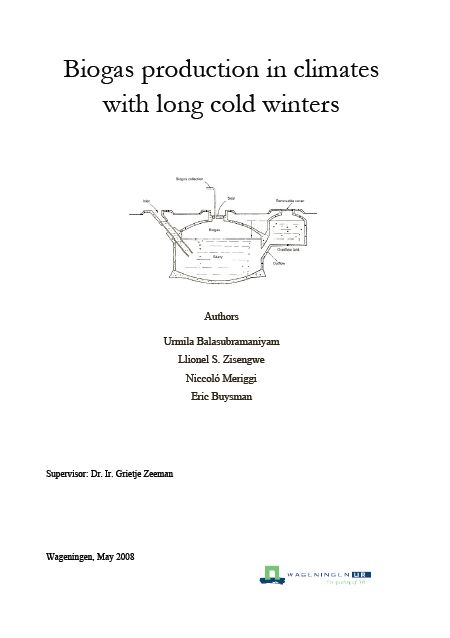
Published in: 2008
Publisher:
For Women in Europe for a Common Future (WECF), The Netherlands
Author:
Balasubramaniyam, U. et al.
Uploaded by:
SuSanA secretariat
Partner profile:
common upload
5298 Views
68 Downloads
Location of library entry
Content - Summary
The concept behind the community based plants is the designing of a plant that can serve more households than those which are suggested for a household plant. This is based on empirical analysis of research work that has been done in other countries with temperatures close to or as
low as those from the study areas that we have ear marked for our biogas project. The theory that has been used in the work on community biogas plants has largely come from India, Denmark, Egypt China and Japan. As pointed out the temperatures found in the study areas have variations at times with those anticipated in (say) Romania, but the basic theory behind it all is that we should be able to find similarities that will stand out to relate the places and give us an opportunity to suggest the projects to WECF.
We have done some thinking as well into the idea of an inoculum circulating plant that has a heating system to help keep viable temperatures in the plant. This report will offer some suggestions into this community based plant and try to offer some suggestions for our
beneficiary communities targeted by WECF.
The main objective of this study is to investigate biogas production in rural areas with cold climates.
• Investigation on the conditions and exploitation of a biogas energy system on low scale, low tech, during winter time in such a way that the needed gas for heating and cooking is during the whole year available
• Investigation on costs of investment, operation and maintenance of a possible low-tech digester system on low scale or community scale
• How to manage the digester system during wintertime, if the temperatures are several weeks far below zero; How to assure enough energy for the families during wintertime?
• Investigation whether a low-tech biogas plant can also be a viable solution if it works only in summer, spring, autumn.
• Investigation on the cost – benefits of a digester system in poor rural areas in countries like Armenia and Romania
• Investigation on experiences and the use of human excreta (mixed or separated fractions) in digester systems, including the hygiene aspects of the residues.
Bibliographic information
Balasubramaniyam, U. et al. (2008). Biogas production in climates with long cold winters. For Women in Europe for a Common Future (WECF), The Netherlands
Filter tags
Biogas systems English Europe & Central Asia North America Renewable energies and climate change (WG3)















